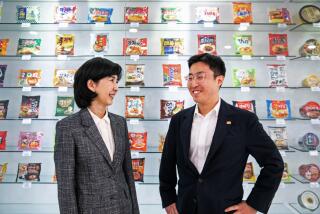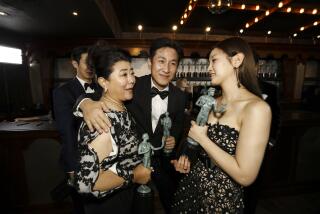Founder of Hyundai Group Stepping Down : Asia: Chung Ju Yung says he’ll tend his rice farm from now on. He hopes to end political retaliation against the conglomerate.
- Share via
SEOUL — Chung Ju Yung, the Hyundai Group’s flamboyant founder who staged a quixotic bid for the South Korean presidency in 1992, abruptly announced Tuesday that he will retire, in a move aimed at ending two years of political retaliation against his multibillion-dollar conglomerate.
“Politics should be handled by politicians,” Chung, 79, said before heading to Tokyo in what is viewed as a temporary exile abroad to placate his political archrival, South Korean President Kim Young Sam.
Chung, who built Hyundai into South Korea’s second-largest business group, claiming $47 billion in annual sales in such fields as cars, computers and construction, said he will spend the rest of his life tending his rice farm in Sosan.
Chung’s exile and retirement as Hyundai’s honorary chairman was viewed as the ruling party’s precondition for ending a protracted war against the business group that has squeezed its ability to raise cheap capital, expand capacity and develop new business fields.
Since Chung first began tangling with Kim’s predecessor, Roh Tae Woo, the government has hit him and his group with an $180-million fine for evading inheritance taxes, a $35-million penalty over a tax evasion case involving Hyundai Merchant Marine Co., a freeze on low-interest Korea Development Bank loans, delayed approval of overseas security issues and a refusal to allow three Hyundai Group companies to go public on the over-the-counter market.
At the same time, the government had approved similar requests by Hyundai’s archrival, Samsung, for KDB loans and permission to go public.
“There has been blatant favoritism toward Samsung,” said Don Lee, analyst with Barclays de Zoete Wedd Securities Ltd. But Chung’s resignation “should pave the way for better relations between Hyundai and the government.”
Lee said Hyundai’s ambitious expansion plan would have been jeopardized without a truce enabling it to acquire low-cost financing. Hyundai Motor Co., for instance, is planning to invest $3.8 billion by 2000 to increase its production capacity to 2.3 million units a year from the current 1.1 million, Lee said. Its aim: to become one of the Top 10 auto makers in the world.
Chung invited the enmity of Korea’s political establishment when he formed a party and waged a wild-card presidential campaign often compared to Ross Perot’s in the United States. His decision to jump into politics stemmed from unhappiness with the ruling party’s policies, among them Roh’s kibosh on one of Chung’s cherished projects: to develop Mt. Diamond with North Korean authorities in his native Kanwan province.
More to Read
Sign up for Essential California
The most important California stories and recommendations in your inbox every morning.
You may occasionally receive promotional content from the Los Angeles Times.













